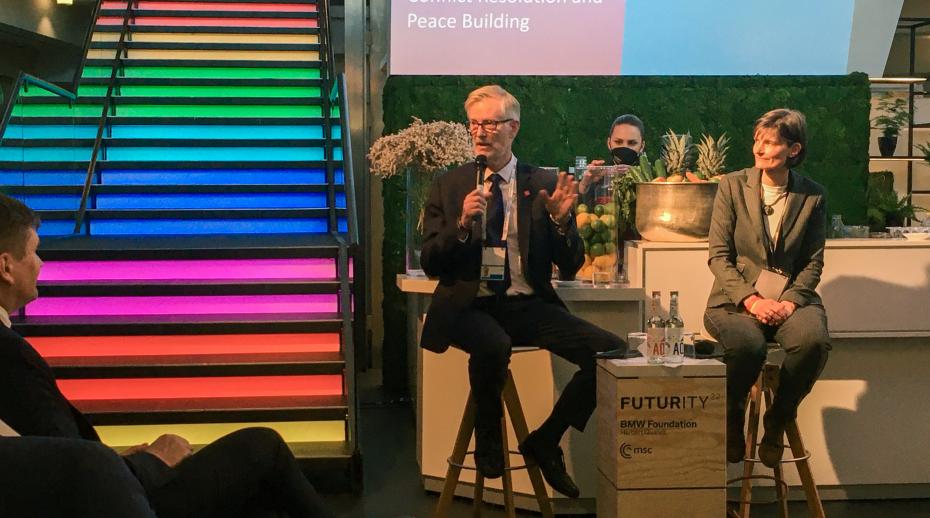|
| NEWS |
 |
| SIPRI co-hosts webinar on security, insecurity and the Anthropocene |
| On 15 February, the editors and chapter authors of the new volume Anthropocene (In)securities: Reflections on Collective Survival 50 Years After the Stockholm Conference joined a webinar to discuss some of the key issues of security and insecurity raised in the Anthropocene—a concept that has been advanced to capture a world marked by profound, accelerating and possibly irreversible environmental change fuelled by human activity. The event was organized by SIPRI, the Stockholm Environment Institute (SEI) and Mistra Geopolitics. |
|
|
Read more | Watch the webinar | Download the volume
|
|
|
 |
| Farsi translation of the SIPRI Yearbook 2021 summary now available |
|
SIPRI is pleased to announce that the Farsi translation of the SIPRI Yearbook 2021 summary is now available. The translation was made possible through cooperation with Professor Saideh Lotfian at the Faculty of Law and Political Science at the University of Tehran. Summaries of SIPRI Yearbook 2021 are also available in Catalan, Dutch, French, Italian, Korean, Spanish and Swedish. Released in June 2021, the 52nd edition of the SIPRI Yearbook is a compendium of cutting-edge information and analysis on developments in armaments, disarmament and international security.
|
|
|
Read more | Download the summary (PDF) | Access translations of the SIPRI Yearbook 2021
|
|
|
 |
| Peace Points: Perspectives for 2022–Arms control |
|
In this Peace Points video, Dan Smith, SIPRI Director, reflects on the arms control agenda at the beginning of 2022. This episode lays out the complex landscape for the prospective extension of the 2010 Strategic Arms Reduction Treaty (New START) and the opportunities for progress in the lead up to the postponed review conference for the 1968 Treaty on the Non-Proliferation of Nuclear Weapons (Non-Proliferation Treaty, NPT).
|
|
|
Watch the video | Access the Peace Points video playlist
|
|
|
 |
| SIPRI at the 2022 Munich Security Conference |
| With climate change as one of the focus themes of this year’s Munich Security Conference, SIPRI hosted a roundtable discussion titled ‘An Environment of Peace: The Challenge of Securing both Peace and a Sustainable Environment’, chaired by Dan Smith, SIPRI Director. At the core of the session was the work of SIPRI’s Environment of Peace initiative, which will launch a major report in May 2022, synthesizing the best available evidence on environmental change and its societal, political and security impacts. |
|
|
Read more | Read about Environment of Peace | Read about recent activities of the initiative
|
|
|
| COMMENTARY |
 |
| A matter of speed? Understanding hypersonic missile systems |
|
Over the past weeks and months, ‘hypersonic missiles’ have again made headlines in global defence news. The term ‘hypersonic’ can be confusing—and potentially distorting—when it is applied to a whole range of missile systems by a range of different actors. This SIPRI Topical Backgrounder seeks to improve the understanding of hypersonic missile systems.
|
|
Read the SIPRI Topical Backgrounder
|
|
|
 |
| The logic of avoiding nuclear war |
|
On 3 January, the leaders of the five permanent members of the United Nations Security Council jointly stated that a nuclear war cannot be won and must never be fought. It had never been affirmed simultaneously by all five. Whilst welcomed by many observers, it was also met with some scepticism. This SIPRI Essay analyses the implications of the statement and assesses its potential as a building block for policy and action going forward.
|
|
Read the SIPRI Essay
|
|
|
|
 |
| External articles |
|
The following article by a SIPRI expert was recently published:
|
|
|
|
|
|
| UPCOMING EVENTS |
| |
| 23–25 May 2022 |
| 2022 Stockholm Forum on Peace and Development |
|
SIPRI is proud to host the 2022 Stockholm Forum on Peace and Development on the theme ‘From a Human Security Crisis Towards an Environment of Peace’. From grassroots and corporate action to global policy decisions, diverse stakeholders and participants will explore policy approaches to address the intersection between environmental stress, human security and socio-intercultural interactions. The Forum sessions will pave the way for discussions at the Stockholm+50 Conference, hosted by Sweden on 1–3 June.
|
|
Read more
|
|
| RECENT EVENTS |
| |
| 25 January 2022 |
| SIPRI and UNDP host expert consultation on two upcoming flagship publications |
|
On 25 January, SIPRI and the UN Development Programme (UNDP) organized a joint virtual consultation to inform the preparations of two flagship reports, SIPRI’s Environment of Peace report and UNDP’s ‘2021–22 Human Development Report’. As the scope and key topics of these two reports are closely linked, the aim of the joint consultation was to discuss areas of common or diverging analysis and emerging findings. The participants reflected on a central theme in both reports that the way humans are interacting with nature is creating significant risks to peace and security. The participants explored issues such as development pathways, insecurity, governance and inequality.
|
|
Read more
|
|
| STAFF NEWS |
Three current openings
SIPRI is currently recruiting for three positions:
- Head of Operations (Rolling selection).
- Management Assistant (Closing date: 6 March).
- Office Assistant (Closing date: 6 March).
|
|
Read more
|
|
|
| PUBLICATIONS |
 |
| Climate Change and Violent Conflict in West Africa: Assessing the Evidence |
| West Africa is widely cited as a hotspot of climate change and insecurity. This SIPRI Insights paper uses a systematic literature review of academic research to build a better understanding of the relationship between climate change and violent conflict in the region. Its findings highlight a number of important variables in the relationship between climate change and violent conflict in West Africa, structured around four established ‘pathways’ of climate insecurity: worsening livelihood conditions; increasing migration and changing pastoral mobility patterns; tactical considerations by armed groups; and elite exploitation of local grievances. |
|
Read the SIPRI Insights on Peace and Security
|
|
|
 |
| Multidomain Deterrence and Strategic Stability in China |
| Over the past few years, China has displayed a wide range of advances in military capabilities and infrastructure. While China and the United States remain at political odds, there are indications that China’s strategies in the space, cyberspace and nuclear domains are increasingly converging with those of the USA, as well as of Russia. A key question is whether this strategic convergence is a stabilizing or destabilizing phenomenon. To answer the question, this paper explores the current state of Chinese discussions on multidomain deterrence and strategic stability, with a focus on active defence and proactive defence. |
|
Read the SIPRI Insights on Peace and Security
|
|
|
 |
| SIPRI Yearbook 2021 |
SIPRI Yearbook 2021 presents a combination of original data in areas such as world military expenditure, international arms transfers, arms production, nuclear forces, armed conflicts and multilateral peace operations with state-of-the-art analysis of important aspects of arms control, peace and international security. It covers developments during 2020, including:
- the state of nuclear arms control and the entry into force of the 2017 Treaty on the Prohibition of Nuclear Weapons;
- efforts to regulate lethal autonomous weapon systems, and state behaviour in cyberspace and space;
- regional and country-specific overviews of armed conflicts; and
- the impact of the unfolding Covid-19 pandemic and the UN appeal for a global ceasefire to address it.
|
|
Browse the contents page | Download the summary (PDF) |
Order SIPRI Yearbook 2021 | Download the sample chapter on world nuclear forces (PDF)
|
|
|
| |